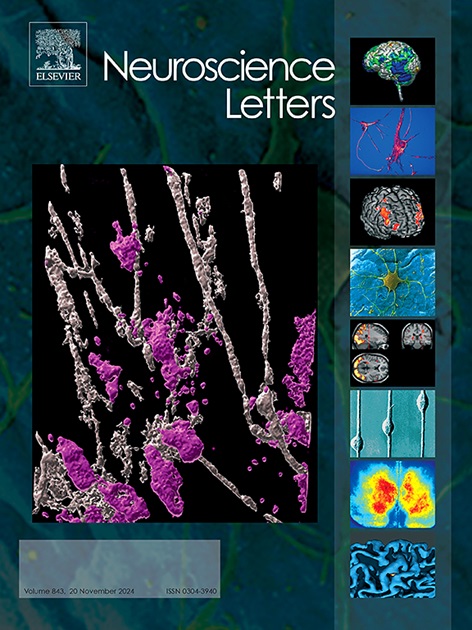Long-term cannabinoid therapy can ameliorate chronic sleep deprivation-induced behavioral and neuroinflammatory changes in mice
IF 2.5
4区 医学
Q3 NEUROSCIENCES
引用次数: 0
Abstract
Endocannabinoid system is an important contributor to body’s immune responses which are significantly impaired by chronic sleep deprivation (cSD). Although cannabinoids can modulate the endocannabinoid system, but most are understudied, especially regarding cSD. To investigate the therapeutic potential of CBD, CBG, CBC and their combinations, current study analyzed cSD-induced memory impairment, depression, microglial responses, cytokine profile and therapeutic effects of cannabinoid treatments using behavioral test and ELISA. Furthermore, molecular docking of these cannabinoids was performed to deduce the binding affinity with cannabinoid receptors and possible entrouge effects. The results showed that memory impairment and depression were more evident in cSD groups. Moreover, microglial activation and pro-inflammatory polarization was also more evident and was supported by increased pro-inflammatory cytokine concentrations in cSD groups. These changes were significantly reversed the cannabinoid groups but the combination of CBD + CBC was more effective than other treatments in reversing these cSD-induced behavioral and neuroinflammatory changes. Whereas, the molecular docking results also corroborated with the neuroimmunological changes observed in the current study, pointing towards the possible therapeutic role.
Significance statement
Chronic SD employs microglial activation/polarization, to exert behavioral impairments and neuroinflammation. This study signifies the therapeutic potential of proper sleep and cannabinoid intake.

长期大麻素治疗可以改善小鼠慢性睡眠剥夺引起的行为和神经炎症变化
内源性大麻素系统是人体免疫反应的重要贡献者,慢性睡眠剥夺严重损害了人体免疫反应。虽然大麻素可以调节内源性大麻素系统,但大多数都未得到充分研究,特别是关于cSD。为了探讨CBD、CBG、CBC及其联合用药的治疗潜力,本研究采用行为测试和酶联免疫吸附法分析了CBD诱导的记忆障碍、抑郁、小胶质细胞反应、细胞因子谱和大麻素治疗的治疗效果。此外,这些大麻素进行分子对接,以推断与大麻素受体的结合亲和力和可能的内灌效应。结果显示,记忆障碍和抑郁在cSD组中更为明显。此外,小胶质细胞活化和促炎极化也更为明显,这与cSD组促炎细胞因子浓度升高有关。大麻素组明显逆转了这些变化,但CBD + CBC联合治疗在逆转这些csd诱导的行为和神经炎症变化方面比其他治疗更有效。而分子对接结果也证实了本研究中观察到的神经免疫学变化,指出了可能的治疗作用。慢性SD通过小胶质细胞激活/极化,造成行为障碍和神经炎症。这项研究表明了适当的睡眠和大麻素摄入的治疗潜力。
本文章由计算机程序翻译,如有差异,请以英文原文为准。
求助全文
约1分钟内获得全文
求助全文
来源期刊

Neuroscience Letters
医学-神经科学
CiteScore
5.20
自引率
0.00%
发文量
408
审稿时长
50 days
期刊介绍:
Neuroscience Letters is devoted to the rapid publication of short, high-quality papers of interest to the broad community of neuroscientists. Only papers which will make a significant addition to the literature in the field will be published. Papers in all areas of neuroscience - molecular, cellular, developmental, systems, behavioral and cognitive, as well as computational - will be considered for publication. Submission of laboratory investigations that shed light on disease mechanisms is encouraged. Special Issues, edited by Guest Editors to cover new and rapidly-moving areas, will include invited mini-reviews. Occasional mini-reviews in especially timely areas will be considered for publication, without invitation, outside of Special Issues; these un-solicited mini-reviews can be submitted without invitation but must be of very high quality. Clinical studies will also be published if they provide new information about organization or actions of the nervous system, or provide new insights into the neurobiology of disease. NSL does not publish case reports.
 求助内容:
求助内容: 应助结果提醒方式:
应助结果提醒方式:


